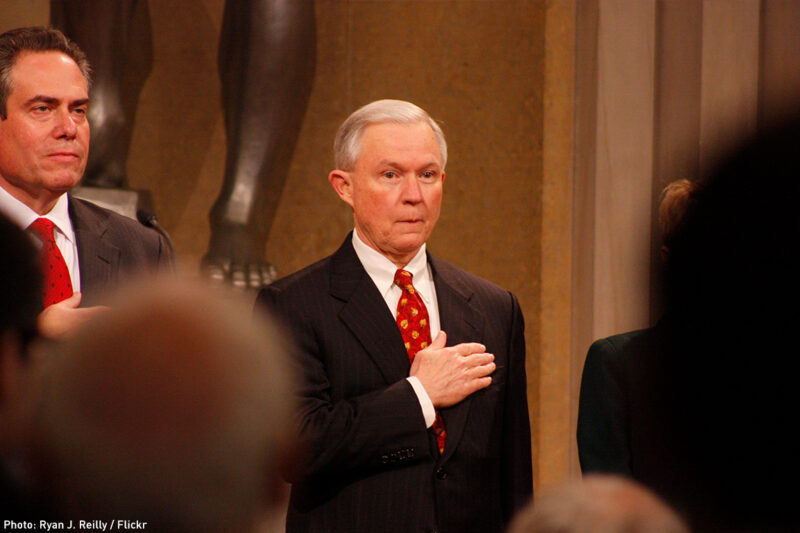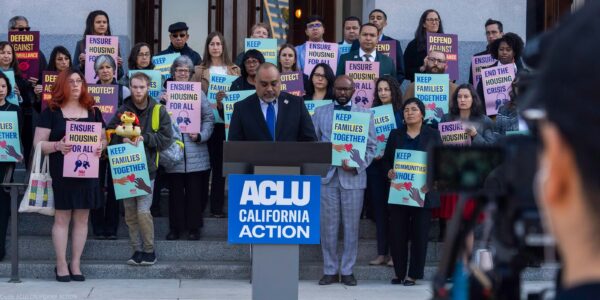
This piece originally appeared at The Guardian.
Before answering questions from the Senate Judiciary Committee on 10 January, then-Sen. Jeff Sessions raised his hand and pledged an oath to tell “the truth, the whole truth, and nothing but the truth”.
Today it appears Sessions violated that oath before the committee, and the Senate Judiciary Committee must open a full investigation into whether the attorney general perjured himself when he said he had no contact with Russian officials during the election.
During the confirmation hearing, Sen. Al Franken (D-Minn.) asked Sessions what he would do if he learned someone affiliated with the Trump campaign had any interaction with the Russian government during the run-up to the election. The question was a pointed and necessary one after intelligence reports that Russia had allegedly intervened in the presidential election to tip it in favor of his potential boss, President Trump.
Sessions replied, “I’m not aware of any of those activities.” Then he went further, stating, “I have been called a surrogate at a time or two in that campaign and I did not have communications with the Russians.” Soon after, Sen. Patrick Leahy (D-Vt.) followed up with written questions asking whether Sessions had contact with Russian officials about the 2016 election. He wrote back one word to the question, “No.”
But Sessions should have been aware of those activities, because he engaged in them. According to The Washington Post last night, Sessions spoke at least twice with Sergey Kislyak, the Russian ambassador to the US who is reportedly a top spy recruiter for Russia, when he was a senior member of the Armed Services Committee as well as an early and trusted adviser to the Trump campaign. One of the encounters was a September meeting between the two men in Sessions’ Senate office.
As Sessions knows all too well: No one is above the law — certainly not those sworn to uphold it.
What did the two talk about? According to one Justice Department official, it’s hard to say. “There’s just not strong recollection of what was said,” the official told the Post.
The position of Sessions’ team at the Justice Department, the White House, and top Republican leadership surrounding these perjury allegations seems to be: Nothing to see here. Sessions has even directly proclaimed his innocence. “I have no idea what this allegation is about,” he said in a statement released last night. “It is false.”
But such disavowals are not good enough by Sessions’ own standards. During the Clinton impeachment proceedings in 1999, the Alabama senator pushed hard for charging President Bill Clinton with perjury and, if convicted, his removal from office. During a C-Span appearance, Sessions rightly sized up the seriousness of the perjury accusation levied at Clinton. “The American people believe no one is above the law and the president has gotten himself into this fix that is very serious,” he said. “I intend to give him an absolutely fair trial.”
What held true then holds true now: The Senate judiciary committee must hold an open public investigation. In 1999, Sen. Sessions himself stated the case for action: “The Senate has demonstrated three times in the last 13 years that perjury by civil officers of the United States requires removal.”
Jeff Sessions should take his own advice and welcome a full and fair investigation into whether he lied during his confirmation hearing. The attorney general deserves to be presumed innocent, but the American people also deserve a full investigation into whether he committed a federal crime by lying under oath as well as the details on what he and Kislyak spoke about during their meetings. Anything less, as Sessions has said before, would weaken our legal system and cast doubt on whether the powerful are held to account for their crimes.
As Sessions knows all too well: No one is above the law — certainly not those sworn to uphold it.
Stay informed
Sign up to be the first to hear about how to take action.
By completing this form, I agree to receive occasional emails per the terms of the ACLU's privacy statement.
By completing this form, I agree to receive occasional emails per the terms of the ACLU's privacy statement.



